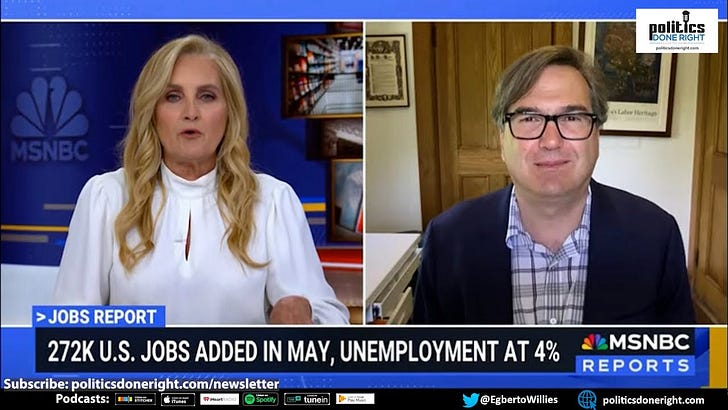Reaction to a great job report is another example of our economic system being a fraud by the few.
President Biden received yet another solid job report. Unfortunately, financial intelligentsia believes it is bad news for interest rates and inflation.
A quick but important note before reading this prescient article
As of today, we have 9.87 thousand followers and 102 supporting (paid) subscribers. Misinformation funded by the deep pockets of our Oligarchy floods the internet. We are using all of our platforms on-air, online, and in publications to counter that. We ask that you invest the equivalent of less than a coffee to ensure we can keep doing this. Please invest in a Democracy that serves all of us by becoming a paid subscriber. It comes with many benefits.
Reaction to a great job report.
In the latest jobs report, the economy continues to grow, with 272,000 more people finding jobs. This surpasses the previous month’s figure of 165,000, signaling a potentially strong and resilient labor market. However, the reaction from Wall Street exposes a deeper, more insidious issue within the economic system. Rather than celebrating the increase in employment, financial markets express concern that this growth might prompt the Federal Reserve to maintain or raise interest rates, which could dampen stock market gains. This reaction underscores the disconnect between economic policies designed to benefit the average American and the priorities of the financial elite.
The Economic Paradox
The paradox at the heart of this issue is that an economy performing well in job creation should logically be seen as positive. More people employed generally means higher overall economic well-being. Yet, the stock market, often touted as a barometer of economic health, reacts negatively. This dissonance highlights the fundamental flaws in measuring and perceiving economic success.
Wall Street’s anxiety over potential interest rate hikes reveals how much the financial sector prioritizes short-term gains over long-term stability and equitable growth. Lower interest rates typically lead to cheaper borrowing costs, boosting corporate profits and, by extension, stock prices. However, these same low rates can fuel asset bubbles and increase economic inequality by disproportionately benefiting those already wealthy enough to invest heavily in the stock market.
Economic Inequality and Systemic Flaws
This job report and its reaction exemplify the economic system’s fraudulent nature. In a truly equitable economy, the populace’s well-being would be directly correlated with the economy’s overall health. Instead, the system is designed to benefit a select few at the expense of the many. As job numbers rose and more Americans found work, Wall Street worried not about the actual economic growth but the implications for their profit margins. This reaction is rooted in the fear that a stronger labor market might lead to higher wages, thereby cutting corporate profits.
Income inequality in the United States is among the highest in the developed world. The creation of 600,000 new millionaires last year starkly contrasts with the struggles of ordinary Americans who face stagnating wages and rising living costs. This disparity is not an accident but a feature of an economic system that rewards those at the top while keeping the majority in precarious financial positions. The fact that a significant portion of these new millionaires has accrued their wealth through financial speculation and not through productive economic activities further illustrates the skewed nature of wealth distribution.
The Role of Corporate Greed
President Biden is attempting to address these issues by targeting corporate greed. His administration’s efforts to make essential goods like groceries and housing more affordable are steps in the right direction. However, these measures are often resisted by powerful corporate interests that benefit from the status quo. Biden’s call for corporations with record profits to lower prices underscores the administration’s recognition of the problem. Still, it also highlights the limitations of policy measures in a system where corporate power is so entrenched.
The resistance to these measures from both the right and some neoliberal factions within the Democratic Party demonstrates the pervasive influence of corporate interests. These groups often frame any attempt to regulate or tax corporations more heavily as an attack on free enterprise, ignoring the broader social benefits of a more equitable economic system.
The Path Forward
For meaningful change to occur, there must be a concerted effort to challenge the systemic issues within the economy. This includes addressing the undue influence of Wall Street and corporate interests on economic policy. One potential solution is stronger support for labor unions and worker cooperatives, which can help ensure that economic growth gains are more evenly distributed. Additionally, progressive taxation policies targeting the wealthiest individuals and corporations can provide the necessary revenue to fund social programs and reduce income inequality.
Furthermore, economic success needs to be measured differently. Rather than focusing solely on metrics like GDP growth and stock market performance, policymakers should prioritize measures that reflect the well-being of the average citizen, such as median income growth, access to healthcare, and educational attainment.
The latest jobs report, while ostensibly positive, reveals the deeper issues within the American economic system. Wall Street’s reaction underscores the disconnect between economic policies and the well-being of the majority of Americans. Addressing this disconnect requires challenging the entrenched power of corporate interests and reorienting economic policy to prioritize the needs of the many over the profits of the few. Only through such fundamental changes can the economy truly serve the interests of all Americans.
Can we count on you to help us reach our goal of 100 new paid subscriptions by month’s end?
The other side has big donors and everyday citizens who invest heavily in platforms that lie and misinform. All we have is you. So, please invest in our media outlet by clicking the subscribe button below to become a paid subscriber. You won’t miss that coffee, but it will make a difference in our politics as we spread the truth about our policies and progressive politics. All paid subscribers get to read my five books on this platform and all subsequent books I write. They will also be privy to subsequent incentives.








Yeah, I get it, people don’t credit the president for good economic news. That’s a separate political issue. How much credit do the president and his corrupt cronies deserve? That’s a whole ’nuther conversation.
Pros:
- The infrastructure bill.
- Covid emergency cash for all. This was huge. Could have been the start of universal income.
- Covid halt on Medicaid disenrollment. Huge. Could have stepped us toward universal healthcare.
- Scattering crumbs toward student debt relief.
Cons:
- Ending Covid cash - very painful. Many people left bitter.
- Medicaid “unwinding”. Even more bitter. Poverty rising.
- Crushed expectations of broader student debt relief.
- STILL hasn’t ended Trump tax breaks for billionaires.
Plus: Gaza GENOCIDE continuing every day.
Biden is a walking nightmare. The only thing worse? Trump.
Thanks for this piece about an encouraging jobs report. As you know, many people don’t read past a headline and subhead. Your subhead says ‘the president received a solid jobs report’. I regret this framing. The American people get a good jobs report, well and good. But IMO, framing everything around the president promotes an unhealthy view of what’s important. ‘The president receives’, trains people to think in really unproductive ways. It’s a kissin’ cousin to horserace journalism. In the future, please don’t spotlight “the president” when the news is not explicitly about the president. Thank you!